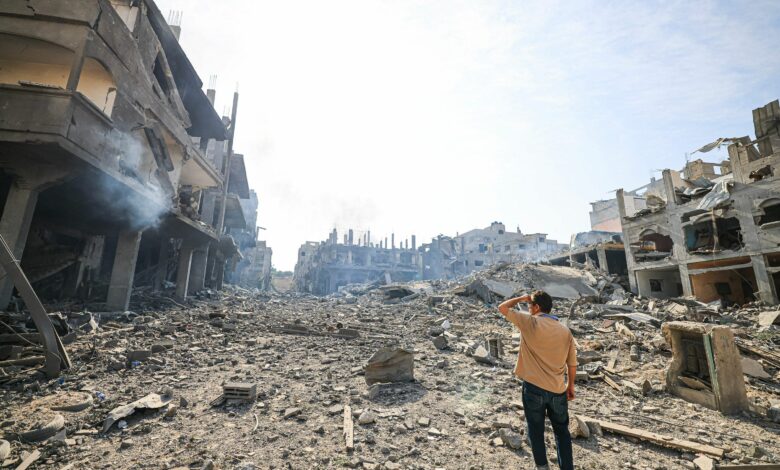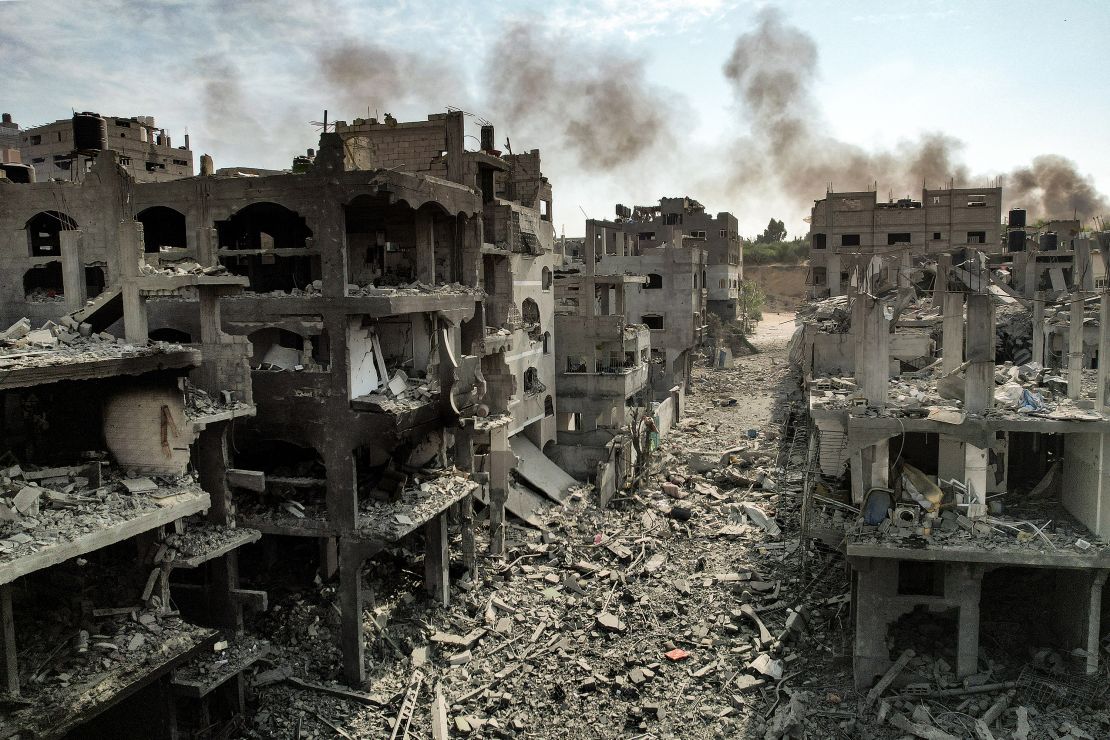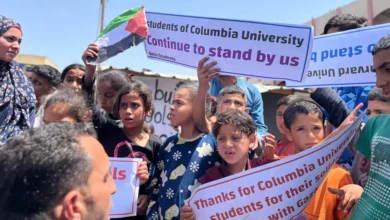
The war in Gaza has been raging for six months and the patience of Israel’s allies is running out. As the death toll in the enclave continues to climb, it’s becoming increasingly clear that Israel has no viable plan for how to end the war or what comes next.
The determination to continue pursuing Hamas in Gaza despite the horrific humanitarian consequences is leaving Israel increasingly isolated on the global stage, with its government facing pressure from all sides.
Multiple international organizations have warned Israel may be committing genocide and even the country’s closest allies are now openly criticizing Prime Minister Benjamin Netanyahu. Calls to halt arms shipments to Israel are growing in the United States and the United Kingdom.
At the same time, Netanyahu and his government are under mounting pressure at home, with protesters back on the streets in large numbers calling for his resignation.
Israel launched the war immediately after the deadly October 7 terror attacks by Hamas. At that time, the Israeli government said the operation had two goals: eliminating Hamas and bringing back the hostages taken by the militants to Gaza.
Six months into the conflict, neither goal has been reached.
While the Israel Defense Forces (IDF) says it has killed thousands of Hamas fighters, most of the group’s top leadership in Gaza, including Yayha Sinwar, continues to evade it, and Hamas’ political leaders are out of reach abroad. More than 100 hostages have been freed, exchanged for Palestinians held in Israeli prisons as part of a truce deal with Hamas in late November. But some 130 hostages, including 99 who are believed still to be alive, remain in Gaza.
Meanwhile, the toll of the war on Palestinians has been horrendous: more than 33,000 people, including thousands of children, have been killed since October 7, according to the Gaza Ministry of Health. On top of that, some 75,000 have been injured and more than a million are on the brink of starvation, facing what international organizations say is “imminent” famine.
“I think (the war) has already far exceeded anybody’s expectations in terms of (its) duration and intensity and scale and deadliness, and there’s no end in sight,” said Khaled Elgindy, senior fellow and director of the Program on Palestine and Israeli-Palestinian Affairs at the Middle East Institute.
Yet Netanyahu is refusing to change tack. While he promised to allow more aid into Gaza following an ultimatum this week from US President Joe Biden, he has rejected calls for a humanitarian ceasefire and for a rethink of his plan to invade Rafah, the southern Gaza city where more than one million people are currently sheltering.
“There is no viable plan for the future of Gaza, not just for the day after, but even today. Nobody knows when this war is going to end, how it’s going to end,” Elgindy told CNN.
No exit strategy
Several experts told CNN that Israel was facing an impossible situation because the goal it has set for itself – eliminating Hamas – is both unachievable and very popular domestically.
Hamas has dominated Gaza ever since it seized power in 2007, controlling all government and security bodies, as well as the healthcare, education and social systems.
“Israel cannot achieve its stated goal of eliminating Hamas, because Hamas is an integral part of the Palestinian society in the West Bank and Gaza. Its popularity has increased in the last several months,” said Nathan Thrall, a Jerusalem-based expert on the Arab-Israeli conflict and author of “A Day in the Life of Abed Salama: Anatomy of a Jerusalem Tragedy.”
“After Israel declared that it has defeated Hamas in the north, you see that every week, Israeli soldiers are dying in the north, so it’s evident that Hamas will continue to exist after this war, whether Israel invades Rafah or doesn’t invade Rafah. Hamas is a major power on the ground and will remain so at the end of this war,” Thrall told CNN.
This means that Israel’s leaders don’t have a viable way out of the conflict, Thrall explained.
“The realistic options in front of them are to continue to occupy Gaza indefinitely, which most Israelis do not want to do, or, alternatively to leave Gaza and have Hamas be the strongest power on the ground whether or not it’s the official face of the government in Gaza,” he said.
Elgindy also said the goal of destroying Hamas was never realistic. “I think even American officials realize, belatedly, that it’s complete madness, that people are allowing this horror to continue as though the goal of destroying Hamas was more important than anything else in the world, including Israel’s own future security,” he said.
“It’s divorced from reality because even if you destroy Hamas, you’re creating something that will be much worse than the future. Because now you have 30,000 people who are dead, 17,000 orphans … what is their view of Israel and the United States going to be when they grow up?”
Israel was a politically divided country before the October 7 attacks, paralyzed by months of large-scale protests against Netanyahu and his government, the most right-wing in Israel’s history, and particularly the prime minister’s proposed judicial overhaul.
But while these political divisions remain, the vast majority of Israelis support the war in Gaza, despite the international outcry over the devastating impact on Palestinian civilians.
“The Israeli public is still traumatized from October 7, they are still in the revenge mode, some don’t want even food to enter. Even if we don’t accept that it’s right, we can understand what their state of mind is,” Elgindy said, adding that while understandable given the horrors of the October 7 terror attacks, this mindset should not influence international policy.
“We can’t allow that state of mind to dictate the policies of the US and the UK and the European Union. You need to have grownups saying ‘this is not acceptable; you cannot use starvation as a weapon’. In other words, it doesn’t matter that the Israeli public isn’t in the mood for stopping this war. It needs to be forced on them,” he said.
The number of Israeli soldiers killed in combat in Gaza since the start of the war has now surpassed 250. While dwarfed by the Palestinian death toll, the losses are nevertheless significant. Hamas killed more than 1,200 people on October 7.

No plan for the future
Harel Chorev, senior researcher at the Moshe Dayan Center for Middle Eastern and African Studies at Tel Aviv University, told CNN that Israel’s lack of a concrete plan is increasingly hurting its relations with its allies.
“Our friends – America first and foremost, Britain, Germany, France – do not trust the government, that they know what they’re doing, that they have a strategic plan for the day after; they don’t trust us to do the right thing,” he said.
Netanyahu unveiled his plan for Gaza’s post-Hamas future in late February, calling for “complete demilitarization” of the enclave and closing off the territory’s southern border with Egypt, as well as the overhaul of Gaza’s civil administration and education systems. He also rejected any pressure from the international community to recognize a Palestinian state.
Many of the proposals were directly opposed by key players at the negotiating table, including the US, Egypt and the United Arab Emirates.
“The plan was one and a half pages, speaking generally about the day after, using all sorts of code words that can be interpreted in all sorts of ways … people were not happy with this, our allies were not happy with this,” Chorev said.
At the same time, Israel continues to refuse even to consider other proposals for the future of Gaza, HA Hellyer, senior associate fellow in security studies at the Royal United Services Institute (RUSI) in London and a non-resident scholar at the Carnegie Endowment for International Peace in Washington DC, told CNN.
“There are lots of credible plans, but none of them are workable, frankly, because of one stumbling block. And that’s the Israelis. The Israelis have made it very clear that they intend to have full security control for the entirety of the territory, which of course throws an unworkable wrench in the workings of any plan that seeks to devolve authority to any other entity,” he said.
Netanyahu has previously also rejected the suggestion that the Palestinian Authority, which administers parts of the occupied West Bank, could take control of Gaza, although the plan outlined in February did not mention this.
Instead, the plan envisions “local entities” running the civil service.
“Again, this was left purposefully vague and it can be interpreted in various ways. It can be local clans, as some interpreted it, and it can be interpreted as a revitalized Palestinian Authority,” Chorev said.
“Most likely, what will happen is, you will have an indefinite Israeli military presence on the ground,” Elgindy said. “You will have something like a breakdown in law and order and more and more chaos. So we’ll see warlords, gangs, clans … Gaza has become a place that is not really livable. If there is someone out there who believes that this is a situation that is going to bring security and safety to Israelis, it’s a completely delusional concept.”
Proposals to establish temporary international security control over Gaza are not feasible given Israel’s stance, experts say.
“If Israel were to admit that it’s an occupying power that needs to withdraw, just as the near entirety of the international community insists, and not to claim the rights of security control over the territory in violation of international law, then you could have something that’s similar to KFOR in Kosovo, an international force as a transition to Palestinians taking over responsibility for the territory,” Hellyer said, referring to the NATO-led peacekeeping force operating in Kosovo.
Thrall also said that most attempts to find alternative plans are not realistic because of Israel’s position.
“They would require placing tremendous pressure on Israel and that is not anywhere in evidence today,” he said, adding that this problem is unlikely to go away even if Netanyahu were to resign.
“In terms of the actual policy toward Gaza, the conduct of this war, the use of the blocking of humanitarian aid as a means of pressuring Hamas in the negotiations, the collective punishment of 2.3 million people in Gaza by cutting off food, water, electricity, those things, there is not great disagreement about by mainstream Israelis,” he said. Netanyahu insisted in a CNN interview last month that his country’s policy was to let as much humanitarian aid into Gaza as is necessary, a claim that’s been widely disputed.
Thrall said that anyone potentially replacing Netanyahu as prime minister would likely put forward similar plans.
Benny Gantz, who this week called for early elections and is widely considered a likely successor to Netanyahu as and when Israelis vote, is a member of Netanyahu’s war government.
“He does not have a significantly different set of ideas for Gaza or for the future of Israel, Palestine or for Palestinian sovereignty. And if you look at the plan by (fellow war cabinet minister) Gadi Eisenkot, his plan for Gaza, which was supposed to be a rebuttal against Netanyahu’s wholly unrealistic plan, was very similar to it,” Thrall said.
“Whether it’s Netanyahu or somebody else is not the central issue with respect to the Palestinians.”




